Coca Cola's Ethical Stance and CSR Policies in India - Report
VerifiedAdded on 2023/03/23
|7
|1978
|43
Report
AI Summary
This report analyzes Coca-Cola's corporate social responsibility (CSR) practices in India, focusing on the ethical and environmental impacts of its operations. It begins with an introduction to Coca-Cola India, highlighting its product offerings and the importance of CSR in balancing shareholder interests with community and environmental concerns. The report then presents a case study of Coca-Cola's operations in India, detailing issues such as groundwater overexploitation, water pollution, and the presence of toxins in its products, leading to public outcry. The analysis incorporates ethical theories, specifically utilitarianism and communitarianism, to evaluate the company's actions. It argues that Coca-Cola's practices have often failed to align with these theories, causing harm to local communities and the environment. The report concludes with a critical analysis of the situation and offers suggestions for improvements, including water stewardship, waste management, and adherence to international guidelines on toxins. Finally, it emphasizes the need for Coca-Cola to balance profit maximization with environmental conservation and ethical business practices for its long-term sustainability.
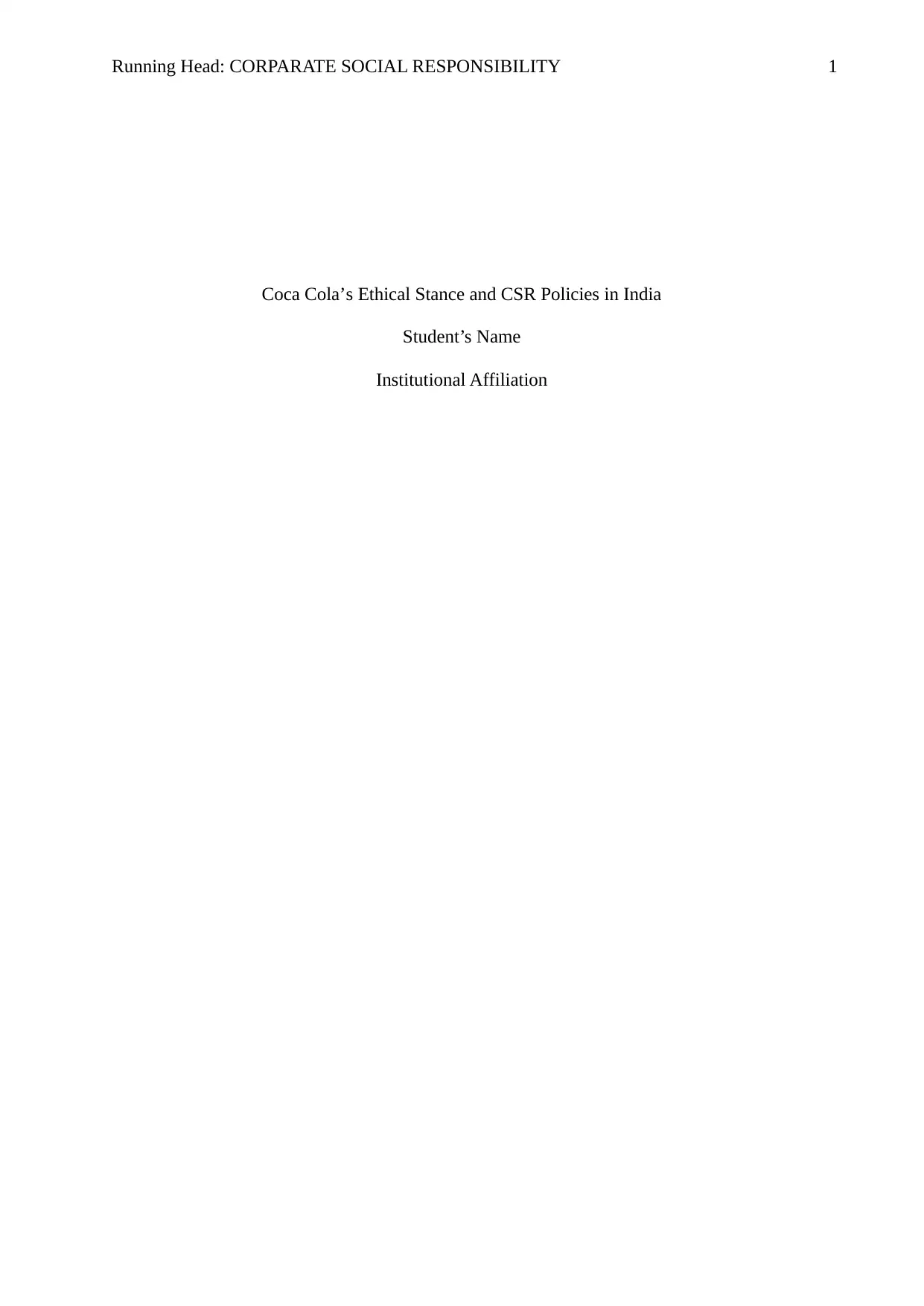
Running Head: CORPARATE SOCIAL RESPONSIBILITY 1
Coca Cola’s Ethical Stance and CSR Policies in India
Student’s Name
Institutional Affiliation
Coca Cola’s Ethical Stance and CSR Policies in India
Student’s Name
Institutional Affiliation
Paraphrase This Document
Need a fresh take? Get an instant paraphrase of this document with our AI Paraphraser
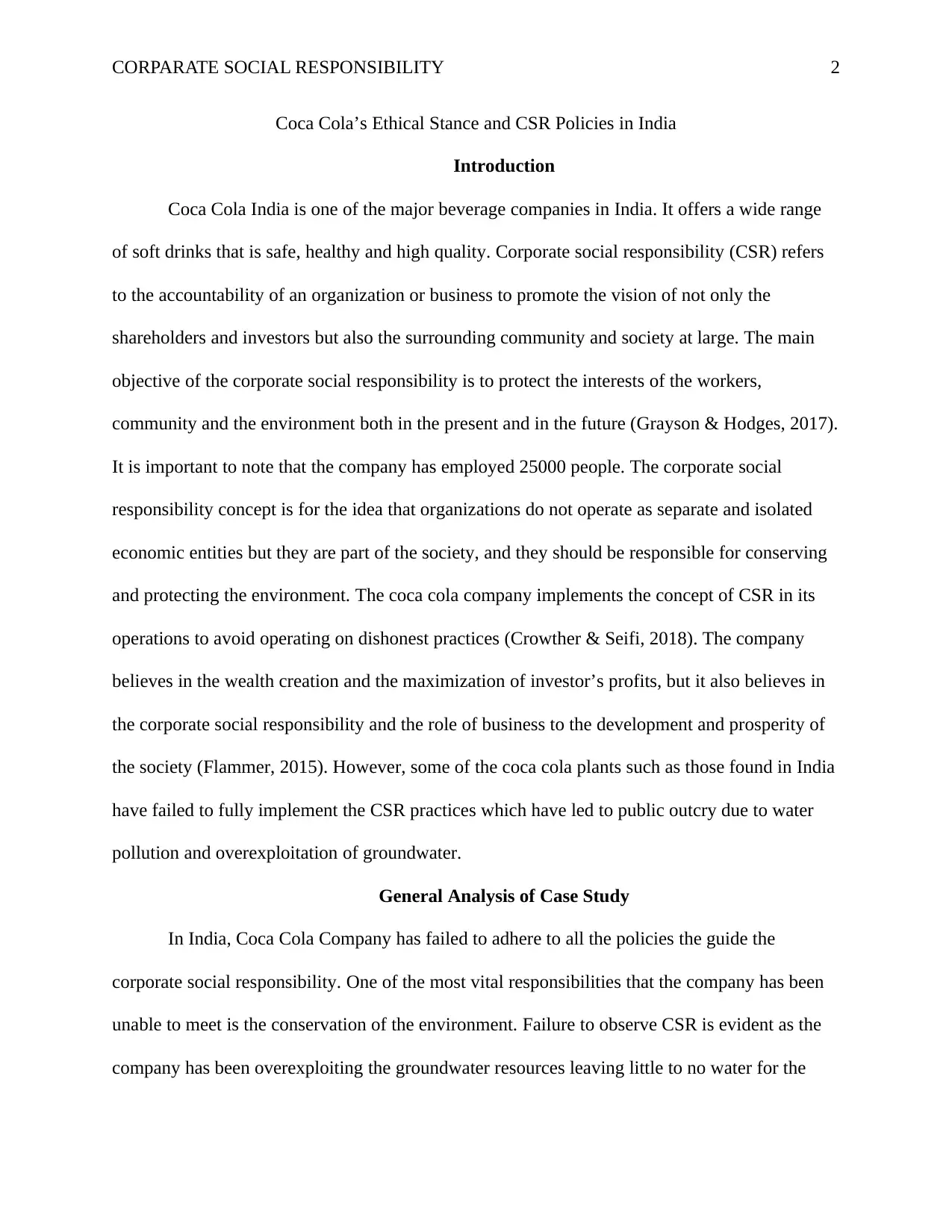
CORPARATE SOCIAL RESPONSIBILITY
Coca Cola’s Ethical Stance and CSR Policies in India
Introduction
Coca Cola India is one of the major beverage companies in India. It offers a wide range
of soft drinks that is safe, healthy and high quality. Corporate social responsibility (CSR) refers
to the accountability of an organization or business to promote the vision of not only the
shareholders and investors but also the surrounding community and society at large. The main
objective of the corporate social responsibility is to protect the interests of the workers,
community and the environment both in the present and in the future (Grayson & Hodges, 2017).
It is important to note that the company has employed 25000 people. The corporate social
responsibility concept is for the idea that organizations do not operate as separate and isolated
economic entities but they are part of the society, and they should be responsible for conserving
and protecting the environment. The coca cola company implements the concept of CSR in its
operations to avoid operating on dishonest practices (Crowther & Seifi, 2018). The company
believes in the wealth creation and the maximization of investor’s profits, but it also believes in
the corporate social responsibility and the role of business to the development and prosperity of
the society (Flammer, 2015). However, some of the coca cola plants such as those found in India
have failed to fully implement the CSR practices which have led to public outcry due to water
pollution and overexploitation of groundwater.
General Analysis of Case Study
In India, Coca Cola Company has failed to adhere to all the policies the guide the
corporate social responsibility. One of the most vital responsibilities that the company has been
unable to meet is the conservation of the environment. Failure to observe CSR is evident as the
company has been overexploiting the groundwater resources leaving little to no water for the
2
Coca Cola’s Ethical Stance and CSR Policies in India
Introduction
Coca Cola India is one of the major beverage companies in India. It offers a wide range
of soft drinks that is safe, healthy and high quality. Corporate social responsibility (CSR) refers
to the accountability of an organization or business to promote the vision of not only the
shareholders and investors but also the surrounding community and society at large. The main
objective of the corporate social responsibility is to protect the interests of the workers,
community and the environment both in the present and in the future (Grayson & Hodges, 2017).
It is important to note that the company has employed 25000 people. The corporate social
responsibility concept is for the idea that organizations do not operate as separate and isolated
economic entities but they are part of the society, and they should be responsible for conserving
and protecting the environment. The coca cola company implements the concept of CSR in its
operations to avoid operating on dishonest practices (Crowther & Seifi, 2018). The company
believes in the wealth creation and the maximization of investor’s profits, but it also believes in
the corporate social responsibility and the role of business to the development and prosperity of
the society (Flammer, 2015). However, some of the coca cola plants such as those found in India
have failed to fully implement the CSR practices which have led to public outcry due to water
pollution and overexploitation of groundwater.
General Analysis of Case Study
In India, Coca Cola Company has failed to adhere to all the policies the guide the
corporate social responsibility. One of the most vital responsibilities that the company has been
unable to meet is the conservation of the environment. Failure to observe CSR is evident as the
company has been overexploiting the groundwater resources leaving little to no water for the
2
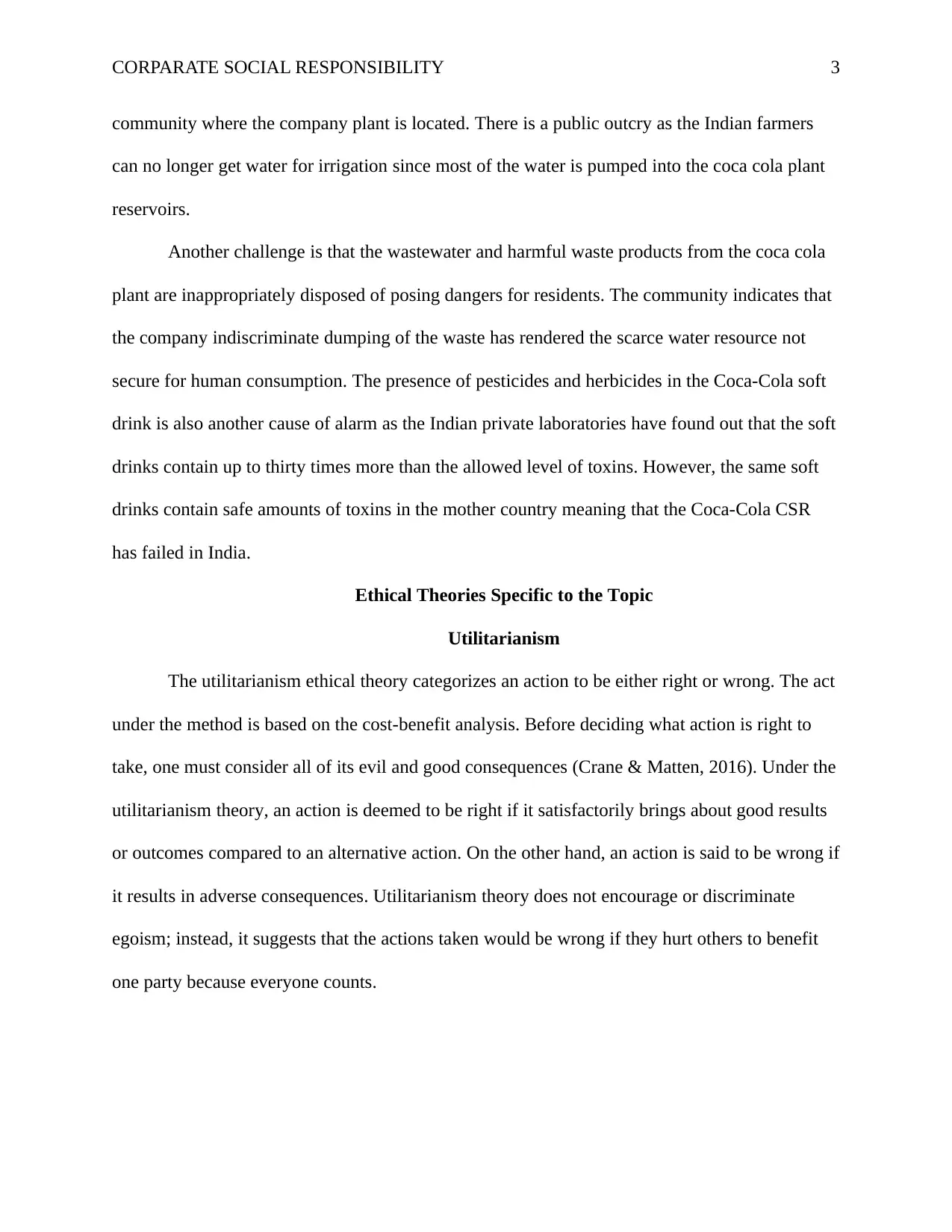
CORPARATE SOCIAL RESPONSIBILITY
community where the company plant is located. There is a public outcry as the Indian farmers
can no longer get water for irrigation since most of the water is pumped into the coca cola plant
reservoirs.
Another challenge is that the wastewater and harmful waste products from the coca cola
plant are inappropriately disposed of posing dangers for residents. The community indicates that
the company indiscriminate dumping of the waste has rendered the scarce water resource not
secure for human consumption. The presence of pesticides and herbicides in the Coca-Cola soft
drink is also another cause of alarm as the Indian private laboratories have found out that the soft
drinks contain up to thirty times more than the allowed level of toxins. However, the same soft
drinks contain safe amounts of toxins in the mother country meaning that the Coca-Cola CSR
has failed in India.
Ethical Theories Specific to the Topic
Utilitarianism
The utilitarianism ethical theory categorizes an action to be either right or wrong. The act
under the method is based on the cost-benefit analysis. Before deciding what action is right to
take, one must consider all of its evil and good consequences (Crane & Matten, 2016). Under the
utilitarianism theory, an action is deemed to be right if it satisfactorily brings about good results
or outcomes compared to an alternative action. On the other hand, an action is said to be wrong if
it results in adverse consequences. Utilitarianism theory does not encourage or discriminate
egoism; instead, it suggests that the actions taken would be wrong if they hurt others to benefit
one party because everyone counts.
3
community where the company plant is located. There is a public outcry as the Indian farmers
can no longer get water for irrigation since most of the water is pumped into the coca cola plant
reservoirs.
Another challenge is that the wastewater and harmful waste products from the coca cola
plant are inappropriately disposed of posing dangers for residents. The community indicates that
the company indiscriminate dumping of the waste has rendered the scarce water resource not
secure for human consumption. The presence of pesticides and herbicides in the Coca-Cola soft
drink is also another cause of alarm as the Indian private laboratories have found out that the soft
drinks contain up to thirty times more than the allowed level of toxins. However, the same soft
drinks contain safe amounts of toxins in the mother country meaning that the Coca-Cola CSR
has failed in India.
Ethical Theories Specific to the Topic
Utilitarianism
The utilitarianism ethical theory categorizes an action to be either right or wrong. The act
under the method is based on the cost-benefit analysis. Before deciding what action is right to
take, one must consider all of its evil and good consequences (Crane & Matten, 2016). Under the
utilitarianism theory, an action is deemed to be right if it satisfactorily brings about good results
or outcomes compared to an alternative action. On the other hand, an action is said to be wrong if
it results in adverse consequences. Utilitarianism theory does not encourage or discriminate
egoism; instead, it suggests that the actions taken would be wrong if they hurt others to benefit
one party because everyone counts.
3
⊘ This is a preview!⊘
Do you want full access?
Subscribe today to unlock all pages.

Trusted by 1+ million students worldwide
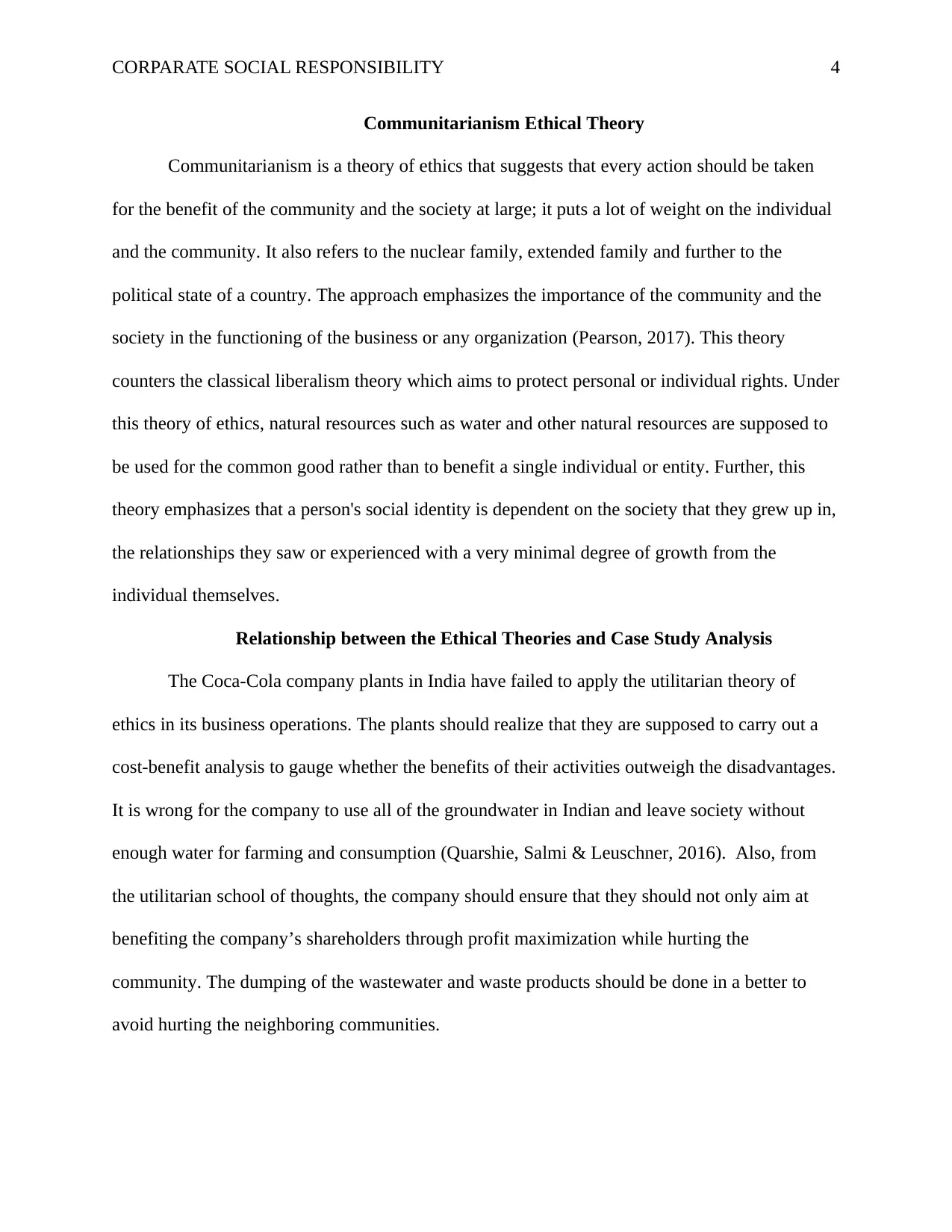
CORPARATE SOCIAL RESPONSIBILITY
Communitarianism Ethical Theory
Communitarianism is a theory of ethics that suggests that every action should be taken
for the benefit of the community and the society at large; it puts a lot of weight on the individual
and the community. It also refers to the nuclear family, extended family and further to the
political state of a country. The approach emphasizes the importance of the community and the
society in the functioning of the business or any organization (Pearson, 2017). This theory
counters the classical liberalism theory which aims to protect personal or individual rights. Under
this theory of ethics, natural resources such as water and other natural resources are supposed to
be used for the common good rather than to benefit a single individual or entity. Further, this
theory emphasizes that a person's social identity is dependent on the society that they grew up in,
the relationships they saw or experienced with a very minimal degree of growth from the
individual themselves.
Relationship between the Ethical Theories and Case Study Analysis
The Coca-Cola company plants in India have failed to apply the utilitarian theory of
ethics in its business operations. The plants should realize that they are supposed to carry out a
cost-benefit analysis to gauge whether the benefits of their activities outweigh the disadvantages.
It is wrong for the company to use all of the groundwater in Indian and leave society without
enough water for farming and consumption (Quarshie, Salmi & Leuschner, 2016). Also, from
the utilitarian school of thoughts, the company should ensure that they should not only aim at
benefiting the company’s shareholders through profit maximization while hurting the
community. The dumping of the wastewater and waste products should be done in a better to
avoid hurting the neighboring communities.
4
Communitarianism Ethical Theory
Communitarianism is a theory of ethics that suggests that every action should be taken
for the benefit of the community and the society at large; it puts a lot of weight on the individual
and the community. It also refers to the nuclear family, extended family and further to the
political state of a country. The approach emphasizes the importance of the community and the
society in the functioning of the business or any organization (Pearson, 2017). This theory
counters the classical liberalism theory which aims to protect personal or individual rights. Under
this theory of ethics, natural resources such as water and other natural resources are supposed to
be used for the common good rather than to benefit a single individual or entity. Further, this
theory emphasizes that a person's social identity is dependent on the society that they grew up in,
the relationships they saw or experienced with a very minimal degree of growth from the
individual themselves.
Relationship between the Ethical Theories and Case Study Analysis
The Coca-Cola company plants in India have failed to apply the utilitarian theory of
ethics in its business operations. The plants should realize that they are supposed to carry out a
cost-benefit analysis to gauge whether the benefits of their activities outweigh the disadvantages.
It is wrong for the company to use all of the groundwater in Indian and leave society without
enough water for farming and consumption (Quarshie, Salmi & Leuschner, 2016). Also, from
the utilitarian school of thoughts, the company should ensure that they should not only aim at
benefiting the company’s shareholders through profit maximization while hurting the
community. The dumping of the wastewater and waste products should be done in a better to
avoid hurting the neighboring communities.
4
Paraphrase This Document
Need a fresh take? Get an instant paraphrase of this document with our AI Paraphraser
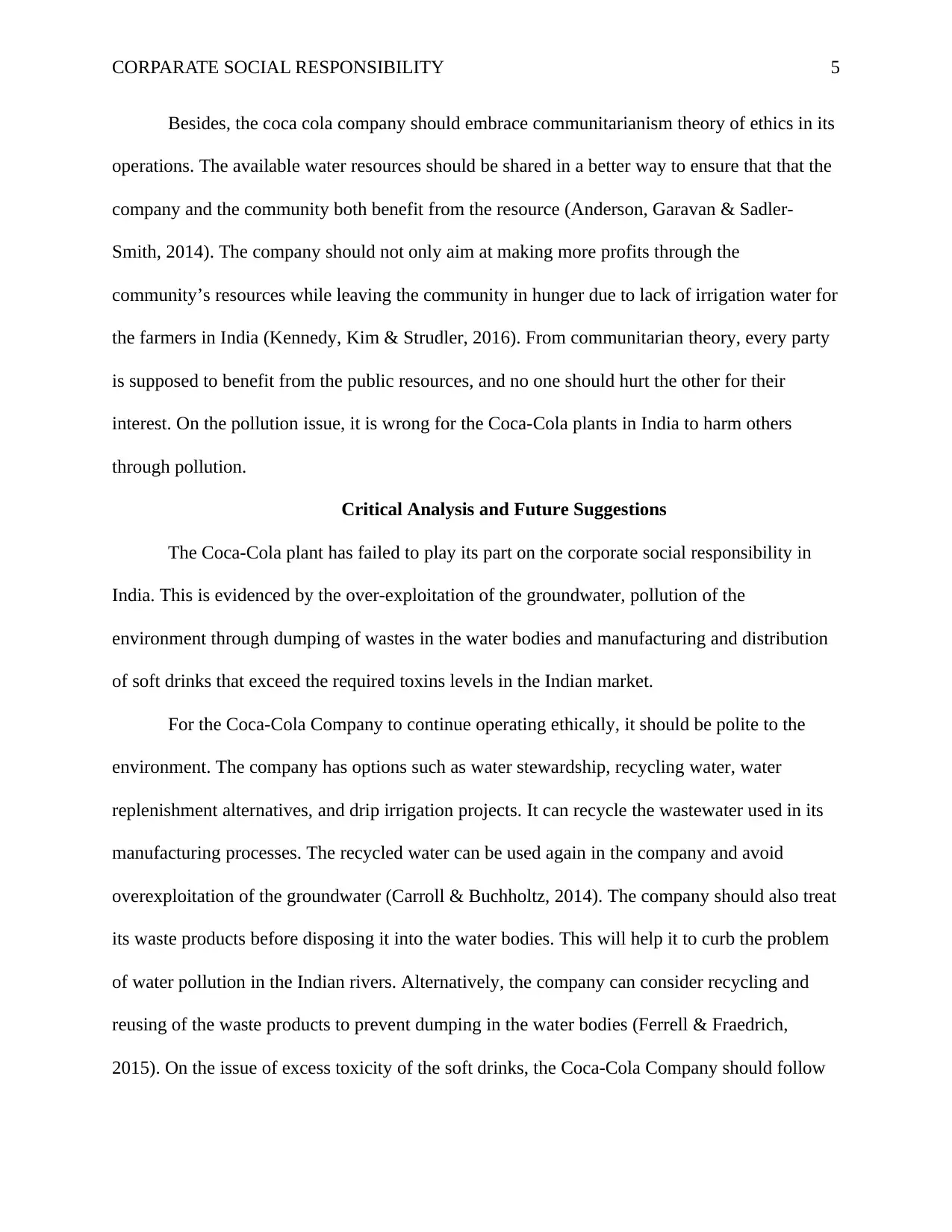
CORPARATE SOCIAL RESPONSIBILITY
Besides, the coca cola company should embrace communitarianism theory of ethics in its
operations. The available water resources should be shared in a better way to ensure that that the
company and the community both benefit from the resource (Anderson, Garavan & Sadler-
Smith, 2014). The company should not only aim at making more profits through the
community’s resources while leaving the community in hunger due to lack of irrigation water for
the farmers in India (Kennedy, Kim & Strudler, 2016). From communitarian theory, every party
is supposed to benefit from the public resources, and no one should hurt the other for their
interest. On the pollution issue, it is wrong for the Coca-Cola plants in India to harm others
through pollution.
Critical Analysis and Future Suggestions
The Coca-Cola plant has failed to play its part on the corporate social responsibility in
India. This is evidenced by the over-exploitation of the groundwater, pollution of the
environment through dumping of wastes in the water bodies and manufacturing and distribution
of soft drinks that exceed the required toxins levels in the Indian market.
For the Coca-Cola Company to continue operating ethically, it should be polite to the
environment. The company has options such as water stewardship, recycling water, water
replenishment alternatives, and drip irrigation projects. It can recycle the wastewater used in its
manufacturing processes. The recycled water can be used again in the company and avoid
overexploitation of the groundwater (Carroll & Buchholtz, 2014). The company should also treat
its waste products before disposing it into the water bodies. This will help it to curb the problem
of water pollution in the Indian rivers. Alternatively, the company can consider recycling and
reusing of the waste products to prevent dumping in the water bodies (Ferrell & Fraedrich,
2015). On the issue of excess toxicity of the soft drinks, the Coca-Cola Company should follow
5
Besides, the coca cola company should embrace communitarianism theory of ethics in its
operations. The available water resources should be shared in a better way to ensure that that the
company and the community both benefit from the resource (Anderson, Garavan & Sadler-
Smith, 2014). The company should not only aim at making more profits through the
community’s resources while leaving the community in hunger due to lack of irrigation water for
the farmers in India (Kennedy, Kim & Strudler, 2016). From communitarian theory, every party
is supposed to benefit from the public resources, and no one should hurt the other for their
interest. On the pollution issue, it is wrong for the Coca-Cola plants in India to harm others
through pollution.
Critical Analysis and Future Suggestions
The Coca-Cola plant has failed to play its part on the corporate social responsibility in
India. This is evidenced by the over-exploitation of the groundwater, pollution of the
environment through dumping of wastes in the water bodies and manufacturing and distribution
of soft drinks that exceed the required toxins levels in the Indian market.
For the Coca-Cola Company to continue operating ethically, it should be polite to the
environment. The company has options such as water stewardship, recycling water, water
replenishment alternatives, and drip irrigation projects. It can recycle the wastewater used in its
manufacturing processes. The recycled water can be used again in the company and avoid
overexploitation of the groundwater (Carroll & Buchholtz, 2014). The company should also treat
its waste products before disposing it into the water bodies. This will help it to curb the problem
of water pollution in the Indian rivers. Alternatively, the company can consider recycling and
reusing of the waste products to prevent dumping in the water bodies (Ferrell & Fraedrich,
2015). On the issue of excess toxicity of the soft drinks, the Coca-Cola Company should follow
5
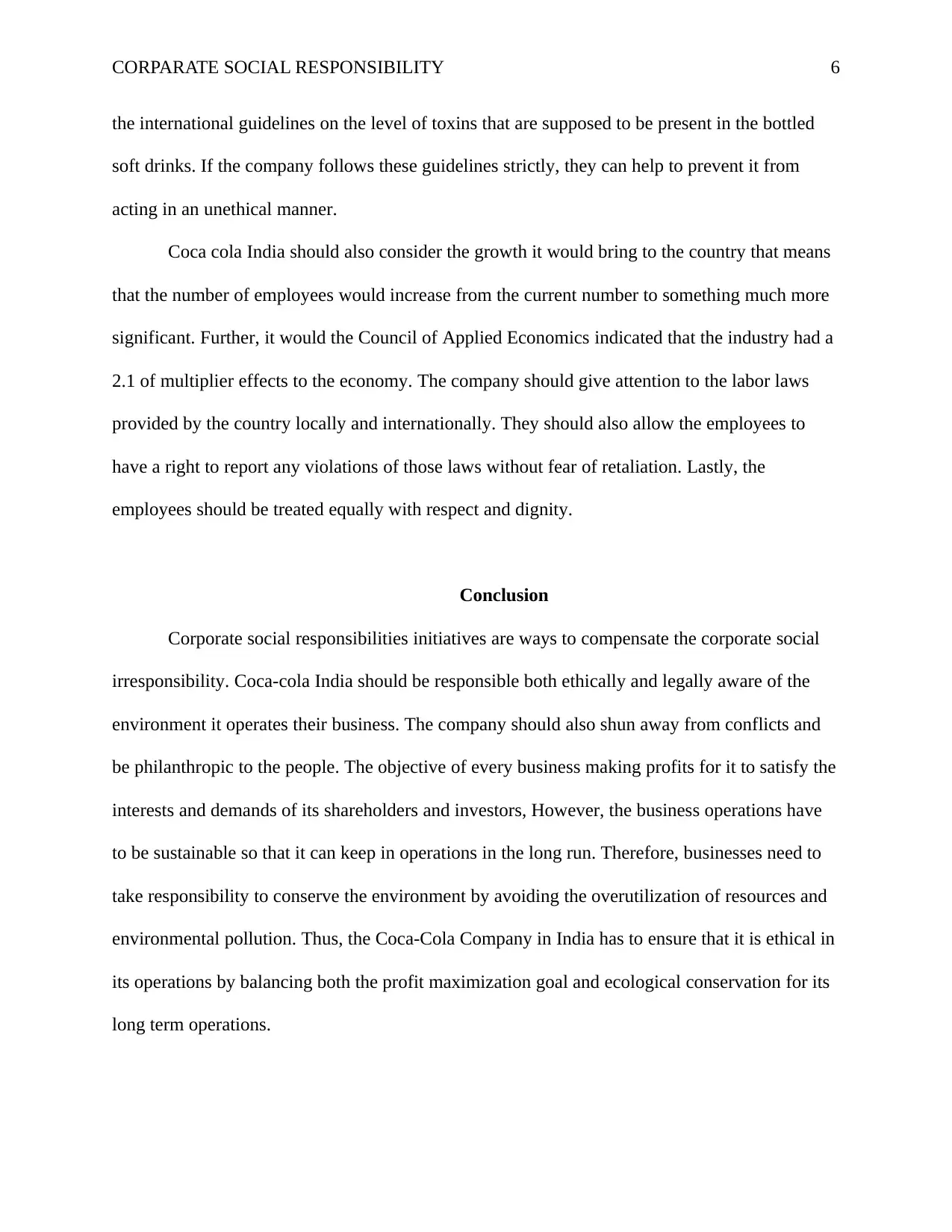
CORPARATE SOCIAL RESPONSIBILITY
the international guidelines on the level of toxins that are supposed to be present in the bottled
soft drinks. If the company follows these guidelines strictly, they can help to prevent it from
acting in an unethical manner.
Coca cola India should also consider the growth it would bring to the country that means
that the number of employees would increase from the current number to something much more
significant. Further, it would the Council of Applied Economics indicated that the industry had a
2.1 of multiplier effects to the economy. The company should give attention to the labor laws
provided by the country locally and internationally. They should also allow the employees to
have a right to report any violations of those laws without fear of retaliation. Lastly, the
employees should be treated equally with respect and dignity.
Conclusion
Corporate social responsibilities initiatives are ways to compensate the corporate social
irresponsibility. Coca-cola India should be responsible both ethically and legally aware of the
environment it operates their business. The company should also shun away from conflicts and
be philanthropic to the people. The objective of every business making profits for it to satisfy the
interests and demands of its shareholders and investors, However, the business operations have
to be sustainable so that it can keep in operations in the long run. Therefore, businesses need to
take responsibility to conserve the environment by avoiding the overutilization of resources and
environmental pollution. Thus, the Coca-Cola Company in India has to ensure that it is ethical in
its operations by balancing both the profit maximization goal and ecological conservation for its
long term operations.
6
the international guidelines on the level of toxins that are supposed to be present in the bottled
soft drinks. If the company follows these guidelines strictly, they can help to prevent it from
acting in an unethical manner.
Coca cola India should also consider the growth it would bring to the country that means
that the number of employees would increase from the current number to something much more
significant. Further, it would the Council of Applied Economics indicated that the industry had a
2.1 of multiplier effects to the economy. The company should give attention to the labor laws
provided by the country locally and internationally. They should also allow the employees to
have a right to report any violations of those laws without fear of retaliation. Lastly, the
employees should be treated equally with respect and dignity.
Conclusion
Corporate social responsibilities initiatives are ways to compensate the corporate social
irresponsibility. Coca-cola India should be responsible both ethically and legally aware of the
environment it operates their business. The company should also shun away from conflicts and
be philanthropic to the people. The objective of every business making profits for it to satisfy the
interests and demands of its shareholders and investors, However, the business operations have
to be sustainable so that it can keep in operations in the long run. Therefore, businesses need to
take responsibility to conserve the environment by avoiding the overutilization of resources and
environmental pollution. Thus, the Coca-Cola Company in India has to ensure that it is ethical in
its operations by balancing both the profit maximization goal and ecological conservation for its
long term operations.
6
⊘ This is a preview!⊘
Do you want full access?
Subscribe today to unlock all pages.

Trusted by 1+ million students worldwide
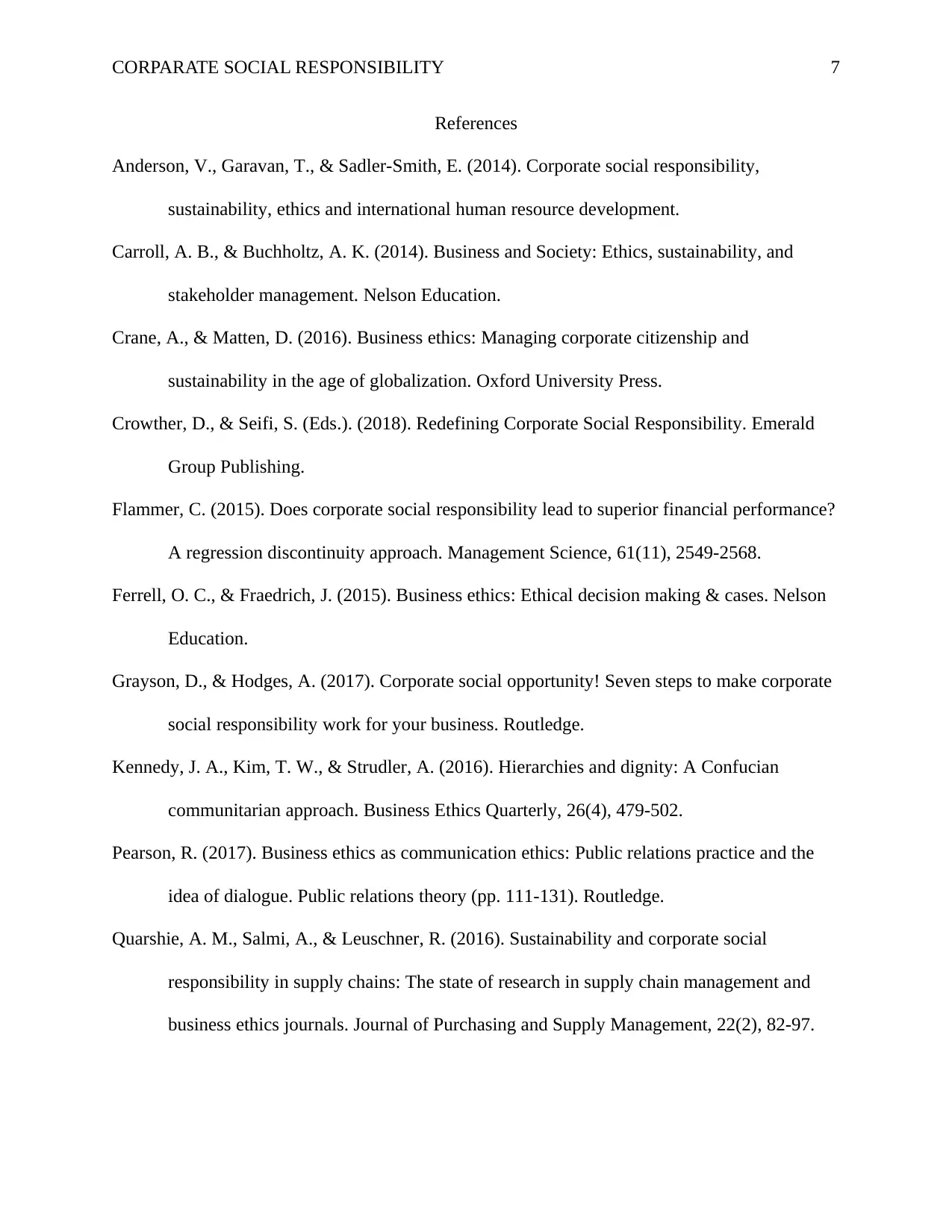
CORPARATE SOCIAL RESPONSIBILITY
References
Anderson, V., Garavan, T., & Sadler-Smith, E. (2014). Corporate social responsibility,
sustainability, ethics and international human resource development.
Carroll, A. B., & Buchholtz, A. K. (2014). Business and Society: Ethics, sustainability, and
stakeholder management. Nelson Education.
Crane, A., & Matten, D. (2016). Business ethics: Managing corporate citizenship and
sustainability in the age of globalization. Oxford University Press.
Crowther, D., & Seifi, S. (Eds.). (2018). Redefining Corporate Social Responsibility. Emerald
Group Publishing.
Flammer, C. (2015). Does corporate social responsibility lead to superior financial performance?
A regression discontinuity approach. Management Science, 61(11), 2549-2568.
Ferrell, O. C., & Fraedrich, J. (2015). Business ethics: Ethical decision making & cases. Nelson
Education.
Grayson, D., & Hodges, A. (2017). Corporate social opportunity! Seven steps to make corporate
social responsibility work for your business. Routledge.
Kennedy, J. A., Kim, T. W., & Strudler, A. (2016). Hierarchies and dignity: A Confucian
communitarian approach. Business Ethics Quarterly, 26(4), 479-502.
Pearson, R. (2017). Business ethics as communication ethics: Public relations practice and the
idea of dialogue. Public relations theory (pp. 111-131). Routledge.
Quarshie, A. M., Salmi, A., & Leuschner, R. (2016). Sustainability and corporate social
responsibility in supply chains: The state of research in supply chain management and
business ethics journals. Journal of Purchasing and Supply Management, 22(2), 82-97.
7
References
Anderson, V., Garavan, T., & Sadler-Smith, E. (2014). Corporate social responsibility,
sustainability, ethics and international human resource development.
Carroll, A. B., & Buchholtz, A. K. (2014). Business and Society: Ethics, sustainability, and
stakeholder management. Nelson Education.
Crane, A., & Matten, D. (2016). Business ethics: Managing corporate citizenship and
sustainability in the age of globalization. Oxford University Press.
Crowther, D., & Seifi, S. (Eds.). (2018). Redefining Corporate Social Responsibility. Emerald
Group Publishing.
Flammer, C. (2015). Does corporate social responsibility lead to superior financial performance?
A regression discontinuity approach. Management Science, 61(11), 2549-2568.
Ferrell, O. C., & Fraedrich, J. (2015). Business ethics: Ethical decision making & cases. Nelson
Education.
Grayson, D., & Hodges, A. (2017). Corporate social opportunity! Seven steps to make corporate
social responsibility work for your business. Routledge.
Kennedy, J. A., Kim, T. W., & Strudler, A. (2016). Hierarchies and dignity: A Confucian
communitarian approach. Business Ethics Quarterly, 26(4), 479-502.
Pearson, R. (2017). Business ethics as communication ethics: Public relations practice and the
idea of dialogue. Public relations theory (pp. 111-131). Routledge.
Quarshie, A. M., Salmi, A., & Leuschner, R. (2016). Sustainability and corporate social
responsibility in supply chains: The state of research in supply chain management and
business ethics journals. Journal of Purchasing and Supply Management, 22(2), 82-97.
7
1 out of 7
Related Documents
Your All-in-One AI-Powered Toolkit for Academic Success.
+13062052269
info@desklib.com
Available 24*7 on WhatsApp / Email
![[object Object]](/_next/static/media/star-bottom.7253800d.svg)
Unlock your academic potential
Copyright © 2020–2026 A2Z Services. All Rights Reserved. Developed and managed by ZUCOL.





